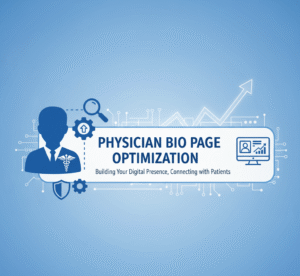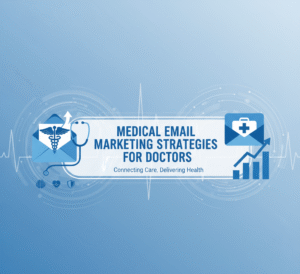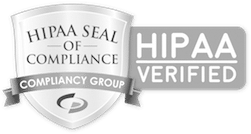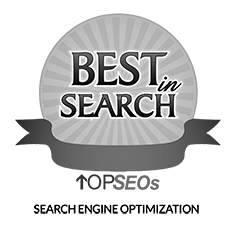“Understand the difference between SEO vs. PPC for doctors and learn why investing in SEO is the smarter long-term strategy to build online authority and attract new patients.”
In today’s digital world, a strong online presence isn’t just an option for medical practices; it’s necessary. Patients are increasingly turning to the internet to find healthcare providers, research conditions, and make informed decisions about their health. But how do you ensure your practice stands out in a crowded online landscape? Understanding the power of SEO vs PPC for doctors becomes crucial. While paid advertising offers quick visibility, Search Engine Optimization (SEO) builds a sustainable, long-term asset that continually attracts qualified patients and establishes your practice as an authority.
Think of your practice’s online presence like a physical building. You could rent a billboard (PPC) for immediate attention, which works for a while. However, building your own well-designed, easily accessible clinic in a prime location (SEO) provides a steady stream of patients for years. This article will dive deep into why consistent SEO efforts are not just a marketing tactic but a vital investment that generates enduring value for your medical or healthcare practice.
The Digital Patient Journey: Why Visibility Matters More Than Ever
Before we dissect SEO vs PPC for doctors, let’s consider how patients find you online. The journey often begins with a search engine. Someone might be looking for “pediatrician near me,” “best cardiologist in [city],” or “symptoms of [condition].” When they type these queries, they’re not just looking for any doctor but the right doctor, a trusted expert who can meet their needs.
If your practice doesn’t appear prominently in these search results, you’re invisible to a significant portion of your potential patient base. This is the fundamental challenge that both SEO and PPC aim to address. However, their approaches and long-term impacts differ dramatically.
Understanding the Basics: SEO vs. PPC for Doctors
To truly understand why SEO is a long-term asset, we must first understand its counterpart, Pay-Per-Click (PPC) advertising.
What is PPC?
PPC, also known as paid search or search engine marketing (SEM), involves bidding on keywords so your ads appear at the top of search engine results pages (SERPs). You pay a fee each time someone clicks on your ad.
Pros of PPC for Doctors:
- Immediate Visibility: Your ads can appear at the top of search results almost instantly.
- Targeted Reach: You can target specific demographics, geographic areas, and times of day.
- Controlled Spending: You set a budget and only pay when someone clicks.
- Quick Data: You get immediate feedback on ad performance, allowing for rapid adjustments.
Cons of PPC for Doctors:
- Costly: As soon as you stop paying, your visibility disappears.
- Ad Fatigue: Users can become accustomed to skipping ads.
- Competitive Bidding: Popular medical keywords are expensive, driving up costs.
- Less Trust: Many users inherently trust organic results more than paid ads.
PPC is great for quick campaigns, promoting a new service, or filling immediate appointment slots. It’s a sprint, delivering fast results that cease when the budget runs out.
What is SEO?
Conversely, SEO optimizes your website and online content to rank higher in organic (non-paid) search engine results. This involves various strategies, from technical website improvements to creating high-quality, relevant content.
Pros of SEO for Doctors:
- Long-Term Value: Once you achieve high rankings, you can maintain them continuously, providing sustained visibility.
- Increased Trust & Credibility: Users generally perceive organic results as more trustworthy and authoritative.
- Cost-Effective Over Time: While there’s an initial investment, the cost per acquisition decreases significantly over the long run.
- Higher Click-Through Rates: Organic listings often receive more clicks than paid ads.
- Broader Reach: Good SEO can improve visibility for a wide range of relevant keywords, not just those you specifically bid on.
- Enhanced User Experience: Many SEO best practices, like fast loading times and mobile responsiveness, also improve the overall experience for your website visitors.
Cons of SEO for Doctors:
- Time-Consuming: It takes time, often several months, to see significant results.
- Ongoing Effort: SEO isn’t a “set it and forget it” strategy; it requires continuous work.
- Algorithm Changes: Search engine algorithms evolve, requiring constant adaptation.
- No Guarantees: While best practices improve chances, no one can guarantee specific rankings.
SEO is a marathon. It builds a durable foundation that attracts patients long after the initial investment.
Why SEO Is a Long-Term Asset: Building Sustainable Online Visibility
Now, let’s explore why SEO is a superior long-term asset for your medical practice, especially considering medical SEO benefits.
1. Enduring Online Authority and Trust
One of the most significant medical SEO benefits is its ability to build lasting authority. When your practice consistently ranks high for relevant keywords, search engines like Google begin to view your website as a credible and authoritative source of information. This trust translates directly to potential patients.
Think about it: when you search for health information, are you more likely to click on a sponsored ad or a result that appears organically at the top of the page? Most people instinctively trust organic results more because they perceive them as having earned their position through relevance and quality, not just payment. This earned trust is invaluable for medical practices, where patient confidence is paramount. Over time, this consistent visibility and perceived authority cement your practice’s reputation online over time.
2. Consistent Influx of Qualified Patients
Unlike PPC, where patient flow stops when your budget runs out, a strong SEO strategy generates a steady stream of qualified patient leads. People searching for medical services often seek specific solutions to their health problems. When your website ranks for those precise queries, you attract individuals actively seeking care and are more likely to become patients.
For example, if someone searches for “dermatologist for acne treatment [your city],” and your practice appears organically, that individual is already highly motivated. This isn’t just general traffic; it’s targeted traffic, leading to higher conversion rates and a more efficient patient acquisition process. This consistent lead generation is a hallmark of a robust long-term SEO strategy.
3. Cost-Effectiveness Over Time
Initially, investing in SEO can feel like a significant commitment. However, when you compare the cumulative costs over several years, SEO often proves to be far more cost-effective than continuous PPC campaigns. While you pay for expertise and ongoing work in SEO, the “cost per click” effectively diminishes as your rankings improve and traffic grows organically.
With PPC, you pay for every single click, indefinitely. If you spend $5000 monthly on PPC for five years, that’s $300,000. While SEO also requires investment, once you achieve strong rankings, the maintenance cost is often lower than the continuous expenditure on paid ads for the same level of visibility. This makes it a wise financial choice for healthcare digital marketing.
4. Improved User Experience and Website Performance
A core component of effective SEO is optimizing your website for users, not just search engines. This includes factors like:
- Website Speed: Faster loading times reduce bounce rates and keep visitors engaged.
- Mobile Responsiveness: A site that looks and functions well on all devices is critical, given that most searches now happen on mobile.Straightforward Navigation: Patients must easily find information about services, doctors, and contact details.
- High-Quality Content: Informative, well-written content answers patient questions and establishes your expertise.
Addressing these elements as part of your healthcare website optimization efforts will please search engines and provide a superior experience for potential and existing patients. A user-friendly website encourages more extended visits, page views, and appointments.
5. Competitive Advantage in a Crowded Market
The healthcare market is increasingly competitive. Many practices are vying for the same patients. A well-executed long-term SEO strategy gives your practice a significant edge. When your competitors rely solely on paid ads that disappear with their budget, your practice will continue to draw patients through organic search.
This isn’t just about being found; it’s about being first and perceived as the most relevant and trusted option. In the long run, consistent SEO work can help your practice dominate your local market for key medical services, ensuring sustained growth and success.
6. Building a Valuable Content Library
A strong SEO strategy for medical practices inherently involves creating valuable content. This might include:
- Blog posts on common health conditions
- FAQs about your services
- Patient testimonials and success stories
- Educational articles on preventive care
- Information about your doctors’ specialties and backgrounds
This content serves multiple purposes. First, it answers patient questions, positioning your practice as a helpful resource. Second, it gives search engines more opportunities to understand your practice and rank you for more relevant keywords. Over time, this content library becomes a significant asset, continually attracting new visitors and reinforcing your authority. This is a crucial element of effective SEO for medical practices.
7. Adapting to Search Engine Evolution
Search engines are constantly evolving. Algorithms change, new features are introduced, and user behavior shifts. A long-term SEO strategy isn’t about implementing static tactics; it’s about continuously monitoring these changes and adapting your approach. This proactive stance ensures your practice remains visible and competitive, regardless of how the online landscape transforms.
This ongoing adaptation means your practice is always at the forefront of digital trends, ensuring your online presence remains robust and effective for years.
The Elements of a Successful Long-Term SEO Strategy for Medical Practices
So, what does a winning long-term SEO strategy look like for a medical practice? It involves a multi-faceted approach that addresses technical, on-page, and off-page SEO factors.
1. Robust Technical SEO
This is the foundation of your online presence. Technical SEO ensures search engines can easily crawl, understand, and index your website. Key aspects include:
- Site Speed: Optimizing images, leveraging browser caching, and using efficient hosting.
- Mobile-Friendliness: Ensuring your site is responsive and provides an excellent experience on smartphones and tablets.
- Secure (HTTPS) Protocol: All medical websites must have an SSL certificate for patient data security and search engine trust.
- XML Sitemaps: Helping search engines discover all critical pages on your site.
- Robot.txt File: Guiding search engine bots on which pages to crawl or avoid.
- Schema Markup: Adding structured data to help search engines understand the context of your content, such as your practice’s address, hours, and doctor specialties. This is especially important for local SEO.
Even the best content might struggle to rank without a technically sound website.
2. On-Page SEO and High-Quality Content
This involves optimizing the actual content and structure of your individual web pages.
- Keyword Research involves identifying the terms and phrases your target patients use to find services like yours (e.g., “pediatric urgent care,” “knee pain treatment [city]”). This directly ties into SEO vs. PPC for doctors, as you optimize for organic searches.
- Title Tags and Meta Descriptions: Crafting compelling and keyword-rich titles and descriptions that entice users to click from the search results.
- Header Tags (H1, H2, H3): Structuring your content logically with clear headings to improve readability and inform search engines about your content’s hierarchy.
- High-Quality, Engaging Content: Creating valuable, informative, original content that directly addresses patient needs and questions. This could be blog posts, service pages, doctor bios, or condition-specific guides. Remember, the goal is to establish your practice as an authority.
- Image Optimization: Using descriptive file names and alt text, and compressing images for faster loading.
- Internal Linking: Linking relevant pages within your website to improve navigation and distribute “link equity.”
Content is king, especially in healthcare. Providing accurate, helpful, and easy-to-understand information builds trust and positions your practice as an expert.
3. Local SEO Optimization
For medical practices, local SEO is paramount. Most patients look for providers within a specific geographic area.
- Google Business Profile (GBP) Optimization: Claiming and thoroughly optimizing your GBP listing with accurate business name, address, phone number (NAP), hours, services, photos, and regular posts. This is often the first thing patients see.
- Consistent NAP Information: Ensuring your practice’s name, address, and phone number are identical across all online directories, your website, and social media.
- Online Reviews and Reputation Management: Patients should be encouraged to leave reviews on Google, Healthgrades, Zocdoc, and other relevant platforms. Responding professionally to all reviews, both positive and negative, is also crucial.
- Local Citations: Listing your practice in relevant online directories and industry-specific websites.
Mastering local SEO ensures your practice appears prominently in “near me” searches and local map packs.
4. Off-Page SEO: Building Authority Through Backlinks
Off-page SEO refers to activities outside your website that improve its search engine ranking. The most crucial factor here is backlinks—links from other reputable websites to yours.
- Quality Over Quantity: A few high-quality backlinks from authoritative health-related websites are far more valuable than many low-quality links.
- Guest Posting: Writing articles for other relevant medical blogs or health websites with links to your site.
- Partnerships: Collaborating with local businesses, hospitals, or community organizations that link to your practice.
- Mentions and Press: Earning mentions from news outlets or industry publications.
Backlinks act as “votes of confidence” from other websites, signaling to search engines that your content is valuable and trustworthy.
The True Value of a Long-Term SEO Investment for Patient Acquisition Online
Consider the long-term impact of these medical SEO benefits. Instead of continually pouring money into PPC advertising in healthcare, where your visibility evaporates the moment your budget does, SEO builds an asset. This asset:
- Generates Passive Leads: Your website works 24/7, attracting patients even when you’re not actively managing a campaign.
- Strengthens Your Brand: Consistent organic visibility reinforces your brand as a leader in your specialty or region.
- Increases Patient Lifetime Value: Patients who find you through organic search often have higher trust and loyalty, leading to repeat visits and referrals.
- Protects Against Market Fluctuations: While PPC costs can skyrocket during peak times, your organic rankings offer a more stable traffic source.
For patient acquisition online, SEO isn’t just about getting clicks; it’s about building a sustainable ecosystem that continually nurtures patient relationships and drives practice growth. It’s a foundational investment in your practice’s future.
Why Quick Fixes and Paid Ads Aren’t Enough (on Their Own)
While PPC certainly has its place in a comprehensive digital marketing for doctors strategy, relying solely on it is like building a house without a foundation. You get immediate shelter, but it’s not sustainable.
Many practices fall into the trap of thinking PPC is the only way to get patients online because the results are so immediate. However, this often leads to an endless spending cycle. The moment you stop paying, your phones stop ringing.
SEO, conversely, is about building that solid foundation. It’s about optimizing your website, creating valuable content, and establishing your authority so that patients find you naturally, without you having to pay for every single interaction. This doesn’t mean you should never use PPC. In fact, a balanced approach combining PPC for immediate needs and SEO for long-term growth is often the most effective. However, the emphasis on SEO is what builds lasting assets.
Choosing the Right Partner: InvigoMedia’s Approach to Healthcare Digital Marketing
Navigating the complexities of organic search healthcare and implementing a robust long-term SEO strategy can be daunting for busy medical professionals. This is where partnering with a specialized digital marketing agency becomes invaluable. InvigoMedia is a leading digital marketing partner, singularly focused on the unique needs of medical and healthcare practices.
InvigoMedia understands that a “one-size-fits-all” approach does not work in healthcare. Their expertise is honed through years of dedicated work in the medical industry, delivering authoritative results and proven experience to practices like yours. They don’t just offer services; they provide a comprehensive partnership to turn your online presence into a powerful, revenue-generating asset.
InvigoMedia’s Comprehensive Services Include:
- Tailored SEO Strategies: InvigoMedia designs bespoke SEO plans beyond generic keywords. They delve into specific medical specialties, local patient demographics, and competitor analysis to create strategies that resonate with your target audience and drive qualified patient traffic. Their focus is on building that durable, long-term asset we’ve discussed.
- Engaging Content Marketing: Understanding that high-quality content is the backbone of successful SEO, InvigoMedia’s team crafts informative, accurate, and patient-centric content. This includes blog posts, service page copy, doctor bios, and educational resources that establish your practice as an authority and answer potential patients’ questions.
- Strategic PPC Management: While emphasizing SEO’s long-term benefits, InvigoMedia also provides expert PPC management. They create highly targeted and cost-effective paid ad campaigns that complement your SEO efforts, capturing immediate patient needs while your organic rankings mature. They ensure your PPC advertising healthcare budget is spent wisely for maximum return.
- Modern Web Design: Your website is your online storefront. InvigoMedia designs visually appealing, user-friendly, and mobile-responsive websites that look professional and convert visitors into patients. They focus on healthcare website optimization to ensure fast loading times, intuitive navigation, and a seamless patient experience.
- Local SEO Dominance: Recognizing the critical importance of local patients, InvigoMedia specializes in optimizing your practice for local search. This includes meticulous Google Business Profile management, consistent NAP citation building, and strategic review generation to ensure you’re the top choice for “near me” searches.
- Reputation Management: InvigoMedia understands the sensitive nature of online reviews in healthcare. They implement proactive strategies to encourage positive patient feedback and provide guidance on professionally managing and responding to all reviews, safeguarding your practice’s online image.
InvigoMedia’s approach isn’t about quick fixes; it’s about building a robust, sustainable digital marketing for doctors framework that continually attracts new patients, strengthens your online reputation, and fosters long-term practice growth. Their team becomes an extension of your practice, working tirelessly to ensure your digital marketing efforts yield tangible, measurable results.
When you partner with Invigo Media, you gain a service provider and a dedicated ally committed to transforming your online presence into your practice’s most valuable asset. They bring years of proven experience and a track record of authoritative results, making them the ideal choice for medical practices looking to thrive in the digital age.
Conclusion
In the ongoing debate of SEO vs PPC for doctors, it’s clear that while both have roles, SEO emerges as the fundamental long-term asset. It builds trust, establishes authority, provides a consistent stream of qualified patients, and offers a more cost-effective solution over time. Investing in a robust long-term SEO strategy is not merely a marketing expense; it’s an investment in your medical practice’s future stability, growth, and reputation.
You transform your website from a simple online brochure into a powerful patient acquisition machine by focusing on high-quality content, technical excellence, local visibility, and building online authority. This strategy, meticulously implemented by experts like InvigoMedia, ensures your practice survives and thrives in the competitive digital landscape, continually attracting the patients who need your specialized care.
Frequently Asked Questions (FAQs)
Q1: Is SEO essential if I’m already using PPC ads?
Yes, absolutely. While PPC provides immediate visibility, it stops working when you stop paying. SEO builds a sustainable, long-term asset that generates organic traffic and patient leads without ongoing ad spend. Many patients also trust organic results more than paid ads. Combining both offers the best of both worlds: immediate impact from PPC and enduring authority from SEO.
Q2: How long does it take to see results from medical SEO?
SEO is a long-term strategy, not a quick fix. You can expect noticeable rankings and traffic improvements within 3-6 months. Significant results, especially for competitive keywords, often take 6-12 months or even longer. Consistency and patience are key.
Q3: What’s the most important factor for medical SEO?
There isn’t one “most important” factor, as SEO is a complex interplay of many elements. However, high-quality, relevant, authoritative content, a technically sound and user-friendly website, and strong local SEO optimization (mainly a well-maintained Google Business Profile) are critical for medical practices. These three pillars build trust with both search engines and potential patients.
Q4: Do online reviews really impact SEO for doctors?
Yes, online reviews are critical, particularly for local SEO. They signal to search engines that your practice is active, reputable, and provides good patient experiences. Positive reviews can boost your visibility in local search results and map packs. Responding to positive and negative reviews also shows engagement and professionalism.
Q5: Can I do SEO for my medical practice or hire an agency?
While you can learn SEO basics, it’s a complex, ever-evolving field. Managing a comprehensive and effective SEO strategy for busy medical professionals can be overwhelming and time-consuming. Hiring a specialized agency like InvigoMedia, which has deep expertise in healthcare digital marketing, ensures your plan is current and effective and delivers the best possible return on investment. They have the tools, knowledge, and experience to implement and maintain a winning SEO plan.
Q6: What’s the difference between local SEO and general SEO?
General SEO aims to improve your website’s ranking in broad search results, regardless of the user’s location. Local SEO, on the other hand, focuses explicitly on ranking higher in searches that have a geographic component (e.g., “pediatrician near me,” “cardiologist in [city]”). Local SEO is often more critical for medical practices because most patients seek care within a specific radius. This involves optimizing your Google Business Profile, local citations, and geo-targeted keywords.
Q7: How often should I update my website’s content for SEO?
Regular content updates are highly beneficial for SEO. Aim to publish new, high-quality blog posts or update existing service pages at least once a month, if not more frequently. This signals to search engines that your website is active and a relevant source of fresh information. It also gives you more opportunities to target new keywords and attract visitors.













